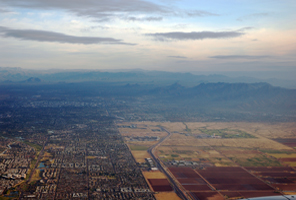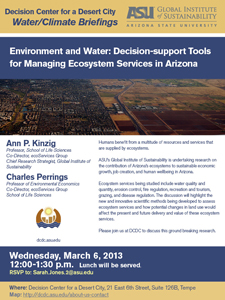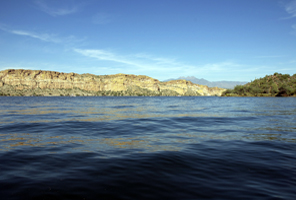Sustainable Cities Network earns Green Government award
March 6, 2013

The U.S. Environmental Protection Agency (EPA) recognized Arizona State University’s Sustainable Cities Network and its efforts in educating and promoting sustainability throughout the state.
On March 4, Jared Blumenfeld, the EPA’s Region 9 administrator and former director of the San Francisco Department of the Environment, presented the Network’s program manager Anne Reichman with the Pacific Southwest Region’s 2012 Green Government award at ASU’s Global Institute of Sustainability.
Reichman says the past four years have been busy for the Network, and collaborations outside of Phoenix have increased.
"The Network shows what can happen when organizations and individuals come together and focus on the positives and the things they share in common," says Reichman. "Sustainability is a very broad topic so it’s exciting to convene the cities on some very specific areas such as solar and energy efficiency."
The Network was developed as a program within the Global Institute of Sustainability in response to challenging sustainability issues surrounding Arizona. Through local partnerships, the Network brings together experts, community members, tribal leaders, and city officials to gather lessons learned and share them with neighboring cities. Work groups collaborate on sustainability issues such as solar installation, urban heat island mitigation, city-wide recycling initiatives, and neighborhood design.
"Sustainability is really about where you live," says Blumenfeld. "And the network that’s been created from in and around metro Phoenix is really a testament to what the Sustainable Cities Network has been willing to do, and also a testament to ASU’s work in the community and ability to think about not just global issues, but local issues."
Since the Network’s inception in 2008, volunteers have connected with local and tribal sustainability practitioners from more than 25 jurisdictions and Maricopa County. The Network is an excellent example of ASU leveraging its place and supplying research to surrounding communities.
"It’s nice to see the cities use the Network as a vehicle by which they can share what they’ve learned," says Reichman.
Since 1999, the EPA has acknowledged scientists, organizations, teachers, journalists, and others for their significant contributions to "protecting public health and preserving our natural surroundings" through its Environmental Awards.
Together, the EPA and the Sustainable Cities Network provide real-world solutions in ways that are applicable, adaptable, and resourceful.
Click here for the article source.



 The U.S. Environmental Protection Agency (EPA) recognized Arizona State University’s
The U.S. Environmental Protection Agency (EPA) recognized Arizona State University’s 
 Monday, March 4, 2013
Monday, March 4, 2013



 Arizona State University continues making strides in sustainability with the implementation of biodiesel use in select vehicles of its facilities truck fleet.
Arizona State University continues making strides in sustainability with the implementation of biodiesel use in select vehicles of its facilities truck fleet.
 Arizona State University released its Sustainability Operations Annual Review 2012 this February. The four-panel pamphlet includes highlights about ASU’s progress in operational sustainability as well as relevant facts for each of the university’s overarching sustainability goals:
Arizona State University released its Sustainability Operations Annual Review 2012 this February. The four-panel pamphlet includes highlights about ASU’s progress in operational sustainability as well as relevant facts for each of the university’s overarching sustainability goals:
 Experts from Arizona State University recently joined the national discussion about the 2,000-mile Keystone XL Pipeline, proposed to carry crude bitumen from Canadian tar sands to oil refineries on the U.S. gulf coast.
Experts from Arizona State University recently joined the national discussion about the 2,000-mile Keystone XL Pipeline, proposed to carry crude bitumen from Canadian tar sands to oil refineries on the U.S. gulf coast.

 A photographer captures a moment. An ecologist collects data over the course of many years. The work of each shapes our understanding.
A photographer captures a moment. An ecologist collects data over the course of many years. The work of each shapes our understanding.
 On January 24, 2013, ASU students, faculty, researchers, and members from across the Phoenix metropolitan area attended a public event titled “The Future of Energy: Brown, Clean, or In Between?”. The event included booth displays by the Arizona Energy Consortium and the university community, a compelling panel discussion, and a dinner reception. The event was hosted by the
On January 24, 2013, ASU students, faculty, researchers, and members from across the Phoenix metropolitan area attended a public event titled “The Future of Energy: Brown, Clean, or In Between?”. The event included booth displays by the Arizona Energy Consortium and the university community, a compelling panel discussion, and a dinner reception. The event was hosted by the  Colleges and communities looking to implement sustainability programs can find inspiration from case studies. Two Arizona State University programs were recently added to the National Wildlife Federation’s searchable
Colleges and communities looking to implement sustainability programs can find inspiration from case studies. Two Arizona State University programs were recently added to the National Wildlife Federation’s searchable  A team of researchers from ASU’s School of Community Resources and Development is examining strategies to support Burma in efforts to increase the involvement of local communities in the tourism value chain, contribute to the local economy and impact poverty reduction among local citizens.
A team of researchers from ASU’s School of Community Resources and Development is examining strategies to support Burma in efforts to increase the involvement of local communities in the tourism value chain, contribute to the local economy and impact poverty reduction among local citizens.
 John Sabo, an associate professor in ASU’s School of Life Sciences and director of Research Development at ASU’s Global Institute of Sustainability, has been named a 2013 Leopold Leadership Fellow.
John Sabo, an associate professor in ASU’s School of Life Sciences and director of Research Development at ASU’s Global Institute of Sustainability, has been named a 2013 Leopold Leadership Fellow.
 The
The  As part of a global cause to bolster solar power technologies, Arizona State University researchers are taking part in three new solar energy projects funded by the Australian and U.S. governments. The investment for these projects includes $68 million for two, eight-year research programs and $15.5 million for 11 collaborative projects.
As part of a global cause to bolster solar power technologies, Arizona State University researchers are taking part in three new solar energy projects funded by the Australian and U.S. governments. The investment for these projects includes $68 million for two, eight-year research programs and $15.5 million for 11 collaborative projects.
 In Phoenix, Arizona and other metropolitan areas, water governance challenges include variable climate conditions, growing demands, and continued groundwater overdraft. Based on an actor-oriented examination of who does what with water and why, along with how people interact with hydro-ecological systems and man-made infrastructure, we present a sustainability appraisal of water governance for the Phoenix region.
In Phoenix, Arizona and other metropolitan areas, water governance challenges include variable climate conditions, growing demands, and continued groundwater overdraft. Based on an actor-oriented examination of who does what with water and why, along with how people interact with hydro-ecological systems and man-made infrastructure, we present a sustainability appraisal of water governance for the Phoenix region.